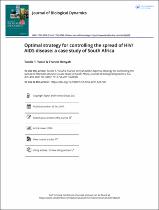Optimal strategy for controlling the spread of HIV/AIDS disease: A case study of South Africa
Abstract
HIV/AIDS disease continues to spread alarmingly despite the huge amounts of resources invested infighting it. There is a need to integrate the series of control measures available to ensure a consistentreduction in the incidence of the disease pending the discovery of its cure. We present a deterministic modelfor controlling the spread of the disease using change in sexual habits and antiretroviral (ARV) therapyas control measures. We formulate a fixed time optimal control problem subject to the model dynamicswith the goal of finding the optimal combination of the two control measures that will minimize the costof the control efforts as well as the incidence of the disease. We estimate the model state initial conditionsand parameter values from the demographic and HIV/AIDS data of South Africa. We use Pontryagin’smaximum principle to derive the optimality system and solve the system numerically. Compared withthe practice in most resource-limited settings where ARV treatment is given only to patients with full-blown AIDS, our simulation results suggest that starting the treatment as soon as the patients progress tothe pre-AIDS stage of the disease coupled with appreciable change in the susceptible individuals’ sexualhabits reduces both the incidence and prevalence of the disease faster. In fact, the results predict thatthe implementation of the proposed strategy would drive new cases of the disease towards eradication in10 years.

